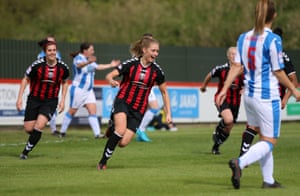Anger and joy greeted the Football Association’s revelation of its redrawn women’s league pyramid on Monday morning when West Ham emerged as the biggest winners and Sunderland the greatest losers.
If catapulting West Ham from the third tier into next season’s all-professional, 11-team Women’s Super League is bold and controversial, so is the decision to demote Sunderland two divisions after refusing to allow them to retain their place in the top flight.
As expected, a newly formed Manchester United will join the predominantly part-time 12-team second tier, rebranded as the Championship from last season’s WSL2.
This revamp follows the FA’s restructure of the women’s leagues and involved clubs having to reapply for their places late last year, before a second, open application phase began in March. Its conclusion has led to Charlton, Leicester City, Lewes and Sheffield United also joining the expanded second tier but left Southampton, Crystal Palace and Derby County disappointed by the failure of their bids.
According to FA sources emotions are “running high” at a few clubs whose applications for the remaining places on offer in the top two divisions were rejected.
Sunderland are foremost among them. Quite apart from Melanie Copeland’s side finishing a creditable seventh in the WSL1 – which will now be known simply as the WSL – the club have historically played an integral part in the wider development of the English women’s game, producing a wealth of England internationals. They will now almost certainly drop two rungs of the ladder, to the Premier League, northern division.
Seven of Phil Neville’s Lionesses side, including Lucy Bronze, Steph Houghton, Jordan Nobbs and Jill Scott, began their careers with Sunderland but things began going wrong when their parent club effectively cut them adrift. According to their most recent accounts Sunderland Ladies lost £424,000 during the financial year ending July 2017. The deficit largely explains why they failed to apply for a Super League place in the initial round of bidding.
By March the composition of the top two divisions was largely established but up to nine vacancies remained. Fifteen teams, including West Ham and Sunderland – now operating in conjunction with Northumbria University – pitched to fill them.
The FA has decided that, because of the weakness of certain bids, it will expand the Super League from 10 teams to 11 rather than the 12 or 14 envisaged. Sunderland’s exit means there is no team north of Manchester in the top tier. West Ham’s arrival strengthens London’s influence and has delighted David Sullivan, their parent club’s co-owner.
“Gaining Super League status is an incredible achievement for everyone involved in our ladies’ team,” Sullivan said. “I would like to say very well done and congratulations for all their hard work.”

Decisions are subject to appeal, to be made within 14 days, and Sunderland have said they are “considering” their position. In the meantime the future will be shrouded in uncertainty for Copeland, who has assisted Neville with the England side, and her squad.
Apparent anomalies abound. Yeovil were granted a top-flight place in March, having convinced the FA they had raised the £350,000 required to turn professional. In the campaign just concluded, though, they scored only two goals in 18 games, collecting two points.
Brighton, who finished second in WSL2, received a top-division licence in March but Doncaster Belles, who finished a place above them, were denied promotion because of a lack of viable finances.
The second tier expands from 10 to 12 sides with Manchester United investing around £5m in their side. “Starting a professional team from scratch is challenging but rewarding and we will make every effort to provide the women with the support and experience needed for them to be successful and to uphold the traditions of our great club,” said Ed Woodward, the executive vice-chairman. Woodward is expected to confirm United’s women will be managed by Casey Stoney, a former England defender.
Quick guide Women's Super League and Championship teams

Arsenal
Birmingham City
Brighton & Hove Albion
Bristol City
Chelsea (pictured)
Everton
Liverpool
Manchester City
Reading
West Ham United
Yeovil Town
Aston Villa
Charlton Athletic
Doncaster Rovers Belles
Durham
Lewes
Leicester City
London Bees
Manchester United
Millwall
Sheffield FC
Sheffield United
Tottenham Hotspur
United’s fellow newcomers are an interesting bunch. Leicester are receiving heavyweight support from their parent club; the Charlton head coach, Riteesh Mishra, is a rare British Asian football manager; Lewes are noteworthy for last year becoming the first English club to pay their male and female players the same; and Sheffield United make the leap from the fourth tier to become the second team from Sheffield in the Championship.
A restructure under which Watford and Oxford United drop into the third tier is the brainchild of Baroness Sue Campbell, the FA’s head of women’s football. “There have been some difficult decisions to make but they’ve been made with the sport’s best interests at heart,” she said. “This is a hugely exciting time for the game and I am hopeful we will look back upon this as one of the most significant decisions made in its history.”
The Super League and Championship start on 8-9 September.